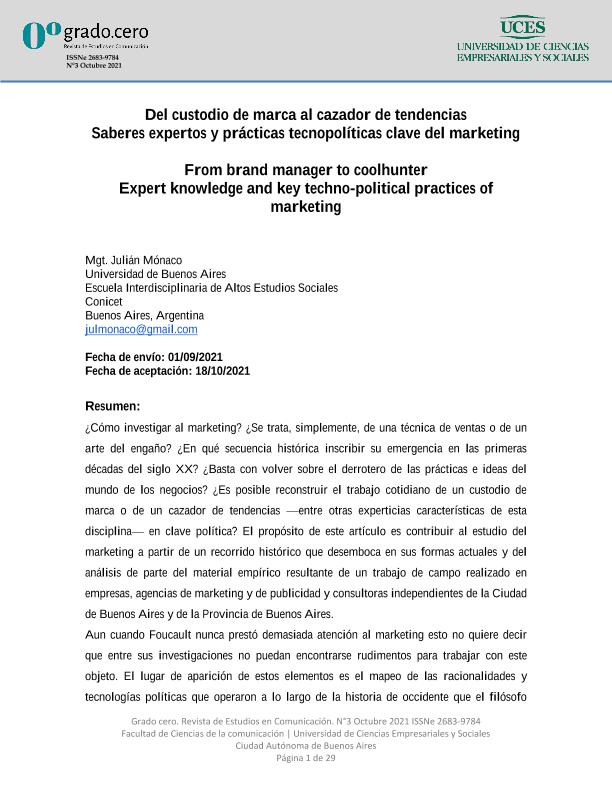Mostrar el registro sencillo del ítem
dc.contributor.author
Mónaco, Julián Andrés

dc.date.available
2022-05-17T17:55:58Z
dc.date.issued
2021-10
dc.identifier.citation
Mónaco, Julián Andrés; Del custodio de marca al cazador de tendencias: Saberes expertos y prácticas tecnopolíticas clave del marketing; Universidad de Ciencias Empresariales y Sociales. Facultad de Ciencias de Comunicación; Grado Cero; 3; 10-2021; 1-29
dc.identifier.uri
http://hdl.handle.net/11336/157778
dc.description.abstract
¿Cómo investigar al marketing? ¿Se trata, simplemente, de una técnica de ventas o de un mero arte del engaño? ¿En qué secuencia histórica inscribir su emergencia en las primeras décadas del siglo XX? ¿Basta con volver sobre el derrotero de las prácticas e ideas del mundo de los negocios? ¿Es posible reconstruir el trabajo cotidiano de un custodio de marca o de un cazador de tendencias —entre otras experticias características de esta disciplina— en clave política? Aun cuando resulta innegable que Foucault nunca prestó demasiada atención al marketing (ni a las noticias ni a la propaganda) esto no quiere decir que entre sus investigaciones no puedan encontrarse ciertos rudimentos para trabajar estas interrogantes. El lugar de aparición de estos elementos es el mapeo de las distintas racionalidades y tecnologías políticas que operaron a lo largo de la historia de occidente que el filósofo francés ensayó hacia la segunda parte de los años setenta del siglo pasado. “El público”, dice Foucault en ese marco, “es la población considerada desde el punto de vista de sus opiniones, sus maneras de hacer, sus comportamientos, sus hábitos, sus prejuicios, sus exigencias” (Foucault, 2011, p. 102). Frente a cierto sentido común ambiente y a cierta crítica fácil del marketing, en este trabajo aspiramos, más bien, a complejizar su análisis interpretándolo, precisamente, como una tecnología de gobierno de los públicos, lo que podría ayudar a explicar, entre otras cuestiones, por qué los tipos de reflexión, de procedimientos y de conocimientos característicos de esta disciplina se extienden desde hace un buen tiempo mucho más allá del ámbito estrictamente comercial.
dc.description.abstract
How to research marketing? Is it simply a sales technique or a art of cheating? In what historical sequence to inscribe its emergence in the first decades of the 20th century? Is it enough to retrace the course of the practices and ideas of the business world? Is it possible to reconstruct the daily work of a brand manager or a coolhunter —among other characteristic expertise of this discipline— in a political key? The purpose of this article is to contribute to the study of marketing from a historical journey that leads to its current forms and from the analysis of part of the empirical material resulting from field work carried out in companies, marketing and advertising agencies and independent consulting firms from the Ciudad de Buenos Aires and the Provincia de Buenos Aires. Even though Foucault never paid much attention to marketing this does not mean that among his investigations certain rudiments cannot be found to work on these objetct. The place of appearance of these elements is the mapping of the different political rationalities and technologies that operated throughout the history of the west that the philosopher rehearsed towards the second part of the 1970s. ―The public‖, says Foucault, ―is the population considered from the point of view of their opinions, their ways of doing, their behaviors, their habits, their prejudices, their demands‖ (Foucault, 2011, p. 102). Faced with a certain common sense and a easy criticism of marketing, in this work we aspire to make its analysis more complex by interpreting it, precisely, as a technology of government of the public, which could help to explain, for example, why the types of reflection, procedures and knowledge characteristic of this discipline have long extended far beyond the commercial sphere.
dc.format
application/pdf
dc.language.iso
spa
dc.publisher
Universidad de Ciencias Empresariales y Sociales. Facultad de Ciencias de Comunicación
dc.rights
info:eu-repo/semantics/openAccess
dc.rights.uri
https://creativecommons.org/licenses/by/2.5/ar/
dc.subject
Marketing
dc.subject
Público
dc.subject
Gobierno
dc.subject
Biopolítica
dc.subject.classification
Otras Comunicación y Medios

dc.subject.classification
Comunicación y Medios

dc.subject.classification
CIENCIAS SOCIALES

dc.title
Del custodio de marca al cazador de tendencias: Saberes expertos y prácticas tecnopolíticas clave del marketing
dc.title
From brand manager to coolhunter: Expert knowledge and key techno-political practices of marketing
dc.type
info:eu-repo/semantics/article
dc.type
info:ar-repo/semantics/artículo
dc.type
info:eu-repo/semantics/publishedVersion
dc.date.updated
2022-05-10T14:24:09Z
dc.identifier.eissn
2683-9784
dc.journal.number
3
dc.journal.pagination
1-29
dc.journal.pais
Argentina

dc.journal.ciudad
Ciudad Autónoma de Buenos Aires
dc.description.fil
Fil: Mónaco, Julián Andrés. Consejo Nacional de Investigaciones Científicas y Técnicas; Argentina. Universidad Nacional de San Martín. Instituto de Altos Estudios Sociales; Argentina. Universidad de Buenos Aires. Facultad de Ciencias Sociales. Carrera de Ciencias de la Comunicación; Argentina
dc.journal.title
Grado Cero
dc.relation.alternativeid
info:eu-repo/semantics/altIdentifier/url/https://publicacionescientificas.uces.edu.ar/index.php/grado/article/view/1239
Archivos asociados
